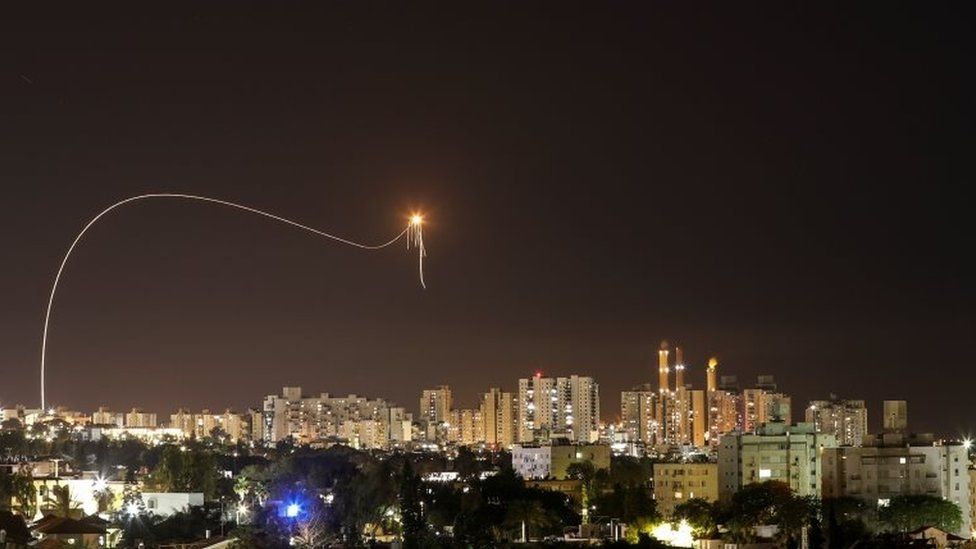Palestinian officials in Gaza say Sunday was the deadliest day since the current fighting with Israel began.
Forty-two people were killed in Israeli air strikes on the territory on Sunday.
Israel's army say Palestinian militants have fired more than 3,000 rockets at Israel over the past week.
United Nations Secretary-General António Guterres has warned that further fighting could plunge the region into an "uncontainable crisis".
He pleaded for an immediate end to the "utterly appalling" violence.
Early on Monday, Israeli warplanes launched 80 air strikes on several areas of Gaza City, shortly after Hamas militants fired a barrage of rockets at southern Israel.
The UN has also warned of fuel shortages in Gaza which could lead to hospitals and other facilities losing power.
Lynn Hastings, UN deputy special co-ordinator for the Middle East Peace Process, told the BBC that she had appealed to Israeli authorities to allow the UN to bring in fuel and supplies but was told it was not safe.
Gaza officials said 42 people, including 16 women and 10 children, died in Sunday's Israeli air strikes.
Ten people, including two children, have been killed in rocket attacks on Israel since the fighting began last Monday, Israel said.
The overall death toll in Gaza now stands at 197 people, including 58 children and 34 women, with 1,230 injured, according to the Hamas-controlled health ministry. Israel says dozens of militants are among the dead.

What happened on Sunday?
Israeli air strikes hit a busy street in Gaza just after midnight on Sunday, causing at least three buildings to collapse and dozens of deaths.
Hamas launched series of rockets towards southern Israel overnight and during the afternoon.
Millions of Israelis scrambled to safe rooms or shelters as sirens went off. Palestinians also tried to take precautions, but in the densely packed and poorly resourced Gaza Strip, many had nowhere to go.
Riyad Eshkuntana told Reuters news agency he put his daughters to sleep in a room of his house that he thought was the furthest from the explosions. Only one of his daughters, Suzy, six, survived the night. His wife and three other children died.
"I ran to check upon the girls," said Mr Eshkuntana. "My wife jumped, she hugged the girls to take them out from the room, then a second airstrike hit the room... The ceilings were destroyed and I was under the rubble."
The Israeli military later said it had conducted strikes on a militant tunnel system in the area. The tunnels' collapse caused the houses above to collapse as well, leading to unintended civilian casualties, it said.

It said it had also struck the homes of Hamas leader Yahya Sinwar and his brother Muhammad Sinwar, whom it described as head of logistics and manpower for the movement.
It was unlikely they were at home at the time of the strikes, according to the Associated Press news agency.
Gazan rescue workers spent the day trying to rescue people from under the debris from the strikes.
The Palestinian health ministry said a doctor was among the dead: Dr Ayman Abu Al-Ouf, head of internal medicine at Shifa hospital and part of the coronavirus team.
In Israel, Hamas rockets hit Ashkelon, Ashdod, Netivot and other parts of central and southern Israel. There were no reports of casualties.
The Israeli military said it had seen the highest ever concentration of rocket attacks on its territory during the past week.
The country's Iron Dome defence system has intercepted many of them. But some caused damage to cars and buildings, including the Yad Michael synagogue in Ashkelon, where a hole was blasted through the wall just before an evening service for the Jewish holiday of Shavuot. No-one was reported hurt and locals moved quickly to clear up the damage so the service could go ahead, according to the Times of Israel.
BBC





